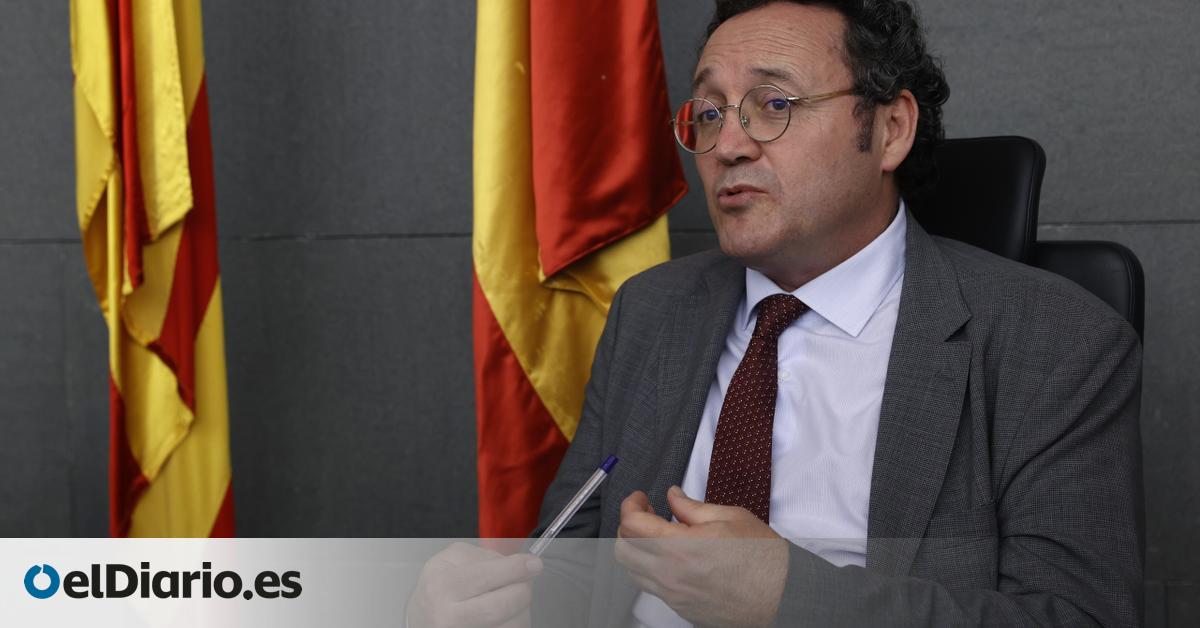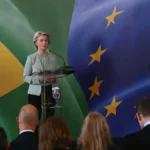
The amnesty intensifies tensions in the Prosecutor’s Office. The State Attorney General, Álvaro García Ortiz, has urged the prosecutors of the process to speak out in favor of applying the amnesty law for all crimes, including embezzlement that affects Carles Puigdemont or Oriol Junqueras; as well as lifting the arrest warrant against the former president, according to the document to which elDiario.es has had access.
This confirms the train crash in the Public Ministry due to the difference in criteria between the attorney general and the prosecutors Javier Zaragoza, Consuelo Madrigal, Fidel Cadena and Jaime Moreno, who defend that the diversion of public funds for the holding of the referendum on 1 -Or it should remain outside the perimeter of the law and the precautionary measures should not be lifted either.
In a writing made public this Friday, García Ortiz describes as “insufficient” the arguments put forward by these prosecutors – who are those who participated in the procés trial – to cast doubt on the possibility of amnesty for embezzlement. And he questions whether they included “extravagant” or “inconsequential” political considerations in his report. He also maintains that lifting the precautionary measures that weigh on several of the defendants is a measure that is not only “adequate” but “necessary” according to the laws.
In recent days, the debate has focused on the crime of embezzlement for which the Supreme Court convicted four of the 12 pro-independence leaders it prosecuted—Junqueras, Jordi Turull, Raül Romeva and Dolors Bassa—and which it also attributes to Puigdemont and the former ministers Toni Comín and Lluís Puig. If the High Court accepted the thesis of the prosecutors who participated in that trial, the convictions for embezzlement would be maintained and the former president who had fled in Belgium since 2017 would continue to be sought and captured for that crime. To do this, the Prosecutor’s Office must previously establish its position. García Ortiz will have the last word on the report that the Public Ministry will deliver to the judges, although it is assumed that the prosecutors of the process will raise the conflict to the leadership of the institution, which will meet next Tuesday.
Amnesty the “totality” of the process
In his writing, García Ortiz orders that “it is appropriate to declare amnesty for all” of the conduct that was and is the subject of these procedures and deploys a battery of legal arguments to refute the positions of Zaragoza, Madrigal, Cadena and Moreno. These prosecutors support the application of the grace measure for the crimes of disobedience and public disorder, but consider that the diversion of funds for 1-O does not fall within the exclusions provided for in the law, which provides for amnesty for crimes of embezzlement. “as long as there has been no enrichment purpose.”
The aforementioned prosecutors interpret that the independence leaders did enjoy a “patrimonial benefit” because, “for profit,” they “appropriated” public money and used it to pay “those they themselves had hired” to carry out the process On the other hand, the attorney general refutes that this thesis “contradicts” the will of the legislator, which clearly alludes to the fact that the “limited” diversion of funds to the referendum is included in the scope of application of the norm and must be amnestied.
In this sense, remember that the Supreme Court itself already concluded that the leaders of the process—although they acted for profit—“did not do so with the purpose of obtaining personal enrichment” when it determined that the latest embezzlement reform did not alter the prosecution. for this crime. On the other hand, the attorney general also affirms that the drafts proposed by the prosecutors “do not respect” what appears in the instructions of the Public Ministry in relation to questions of unconstitutionality and preliminary rulings before the Court of Justice of the European Union (CJEU). . Likewise, he describes as “insufficient” the arguments put forward to question the constitutionality of the norm or calls the analysis of its alleged collision with European laws “incomplete.”
“Improper” political assessments
On the other hand, the attorney general maintains that the process prosecutors included “profusely” in their drafts “political and ideological assessments” and “arguments that go beyond the strictly legal level” and that, in his opinion, compromise the image of neutrality. and impartiality of the Public Prosecutor’s Office. Consequently, he considers them “inappropriate.” For example, he describes as “extravagant” the statement made by these four prosecutors that the law was approved as a compensation to ensure that a political party obtained governability of the country.
Although without citing him, the prosecutors questioned the “abrupt and unexpected change of opinion” of the PSOE, which “went from being totally opposed to the approval of any norm that would grant an amnesty (…) to maintaining just the opposite on immediately subsequent dates.” ” to the July 23 elections. It is a statement that García Ortiz considers “especially striking” for “overflowing” the “strict legal scope to which procedural writings must adhere.”
In their report, the prosecutors also questioned whether the rule was subject to modifications during the debate in Las Cortes. According to García Ortiz, this is a “value judgment” that “ignores the complexity of the parliamentary system.” “That a law is the result of political negotiation and that parliamentary groups try, through negotiations, to achieve their political objectives is not something that allows us to question, from a strictly legal perspective, the legitimacy of the legislative process.” nor the approved standard,” he maintains in his writing.
In this sense, the attorney general questions that beyond “conjectures and hypotheses”, the prosecutors have not provided a single “objective argument” that allows us to conclude that the law does not contribute to the achievement of the objective that the preamble claims to pursue: the institutional, political and social normalization in Catalonia. And, regarding the constitutionality trial, he insists that a ruling from the Public Prosecutor’s Office “cannot use as a canon to assess the constitutionality of a norm and its adaptation to the legal system criteria that are unrelated to the process.”
Raise the conflict to the top
It is now expected that prosecutors Javier Zaragoza, Consuelo Madrigal, Fidel Cadena and Jaime Moreno will oppose this order, who demanded that it be made “in writing in a motivated and founded manner.” An order that anticipates what, in all probability, will be his next steps: activating article 27 of the Organic Statute of the Public Prosecutor’s Office, which allows a matter to be referred to the leadership when it is considered that an order has been received that is “contrary to the laws” or “inadmissible” for any reason.
Anticipating this scenario, García Ortiz warned the members of the Board of Court Prosecutors so that, to the extent possible, they free their agendas for next Tuesday given the possibility that the four prosecutors in the Supreme Court case would decide to insist on your criteria and escalate the conflict. The result of that meeting is not binding on the attorney general, to whom the law grants autonomy to maintain his criteria. And, in any case, the final decision on the application of the amnesty rests with the judges.
Source: www.eldiario.es

